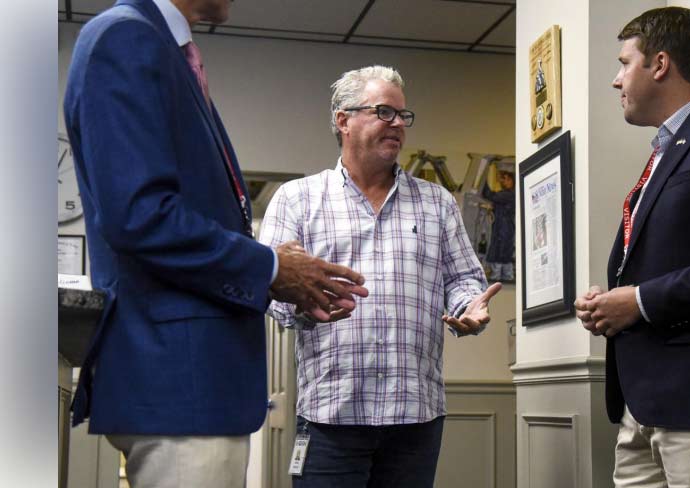Originally published by Jonathan Phelps for the New Hampshire Union Leader
Jul 12, 2021
Inside a nondescript gray building on the West Side of Manchester, machinists using advanced
equipment make parts for the Navy’s latest submarines, including the Columbia-class sub
scheduled to start patrols in 2031.
Like most manufacturers across New Hampshire, Granite State Manufacturing needs more workers
such as engineers, machinists and welders. A huge “now hiring” sign hangs on the building and can
be seen along busy Kelley Street.

Thomas Roy/Union Leader
“We have the equipment. We have the jobs,” Vice President Doug Thomson said during a tour of the
factory Monday. Congressman Chris Pappas arranged the tour to discuss job training programs and
partnerships to help attract skilled workers. New Hampshire once again has the lowest
unemployment rate in the country, at 2.5%.
Granite State Manufacturing has 11 interns — its largest group in the company’s 84-year history. The
company works with both Manchester and Nashua community colleges and the New Hampshire
Job Corps Center to add to its workforce.
“We are even targeting high schools now and trying to go after getting kids even younger who may
decide four-year college isn’t worth the cost,” said John Allard, chairman and CEO. “We’ve got great
opportunities where they can make a lot of money a lot quicker with some of these trades.”
The company has about 140 workers and is looking to hire about 60 more in the next few years,
Thomson said.
“It probably won’t be in the next year because we probably won’t be able to find them,” he said. “The
growth is absolutely there.”
The company operates a second plant in Nashua, which helps draw workers from Massachusetts.
In 2019, the company secured $25 million in defense contracts to produce specialized submarine
systems for the U.S. Navy. The Columbia class is the Navy’s next generation of nuclear-powered
ballistic missile submarines.
The company continues to work on Virginia-class submarines and recently picked up work on the
aging Ohio-class submarines, which will eventually be replaced by Columbia. The products include
cable systems, oxygen-generation systems and two antennae.
The company also creates parts for surface ships and unmanned systems, such as bomb disposal
robots.
Recruiting workers
Allard said the state needs to work to “fill the funnel,” noting manufacturing is a viable career path
for young people. Some adults choose to change careers.
“The funnel is ready,” he said. “We just have to attract more people to take this path instead of
another path.”
The company offers mentoring between senior and younger workers. Some perks include training
programs and money toward two-year schooling.
The work of a machinist is becoming increasingly technology-driven, Thomson said.
One welding engineer with a degree from Ohio State University, who returned to New Hampshire,
walked in one day asking for a job and was hired nearly on the spot. He has drawn interns from his
university.
The company has also worked to attract workers who don’t want to work the traditional 9 a.m. to 5
p.m. Flexible schedules are available for those looking to work part-time.
Some of the job opportunities include assemblers, drivers, engineers, industrial painters, inspectors,
machinists and welders.
Pappas mentioned the pride employees pour into their work and the great “mission-driven” career
available at the company.
A sign inside the plant reads, “Their safety at sea depends on your quality here at GSM.”
“It is exciting to see a company with such longstanding roots in the community doing so well and
working on important projects involving national defense,” Pappas said.
The pandemic highlighted the need to have manufacturing operations stateside, he said.
Company offcials mentioned work with the Navy is steady for the next 15 years.
The Columbia class is considered the No. 1 priority of the Navy.
“We are making parts for it now because that’s how long it takes to build a submarine,” he said.
